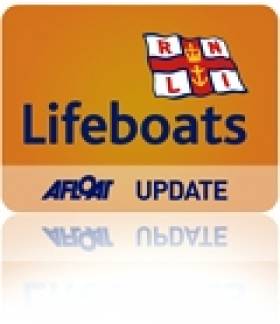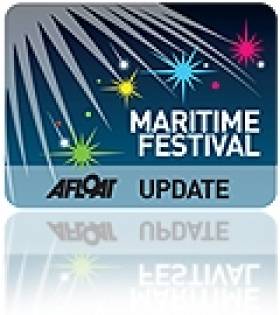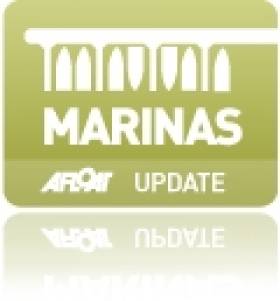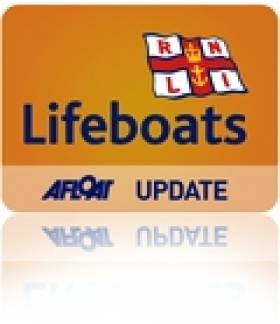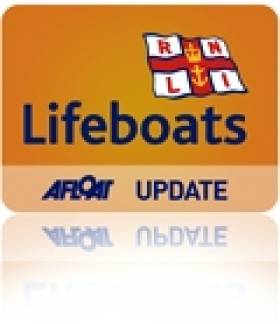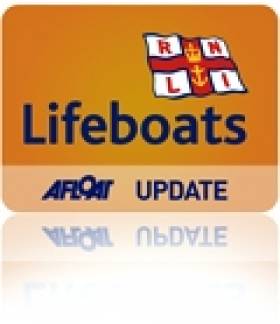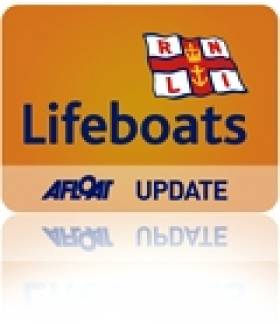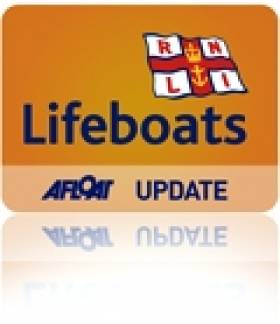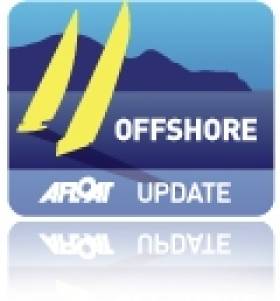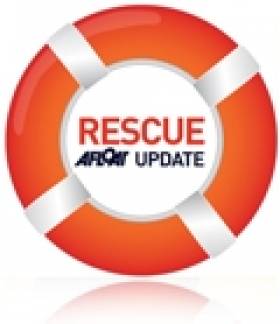Displaying items by tag: Arklow
Arklow RNLI Hosts Summer Solstice Fundraiser
#RNLI - Arklow RNLI supporters are being asked to come out and walk or jog a midnight mile - four laps of the running track at Coral Leisure Centre - in Arklow this Friday 21 June.
The walk/run will take place on the Summer Solstice from 10pm. The event is free and all donations are welcome. Prize raffles will take place, and Stormy Stan and his lifeboat buddies will be on hand to cheer on the participants.
Participants are being asked to assemble at the Lake Coffee Shop in the leisure centre from 10pm, with the walk/jog commencing just before midnight.
Full details are available from Mary at 086 304 5418.
In other Arklow RNLI news, a former chairman of fundraising at the lifeboat unit was honoured recently by the charity for his trojan work recently.
Tommy Annesley, a local councillor, received the Bronze Award at the recent RNLI Annual Presentation of Awards at Trinity College Dublin.
A few days later, Annesley was again honoured, this time by his hometown and fellow councillors when he became Lord Mayor of Arklow.
All at Arklow RNLI including lifeboat crew, fundraisers and other volunteers extended their best wishes to Tommy Annesley for his tenure as Lord Mayor.
Meanwhile, at the recent RNLI AGM in London, Arklow RNLI operations manager Jimmy Tyrell made a presentation to current RNLI operations director Mike Vlasto to honour the relationship and friendship that has developed between them in their years in the RNLI.
- A unique handcrafted piece was made locally in Arklow for the presentation.
Both Tyrell and Vlasto are retiring from the RNLI over the next year.
Stormy Stan Sails In For Arklow's Gathering of the Fleet
#MaritimeFestivals - Stormy Stan sailed into Arklow aboard tall ship Ruth recently as part of the build up to Arklow RNLI’s Gathering of the Fleet Maritime Festival.
This August Bank Holiday weekend, Arklow RNLI and Arklow Harbour will play host to vessels of all shapes and sizes from tall ships such as Ruth to Naval Service vessels, vintage and prototype RNLI lifeboats, emergency service vessels and visiting boats from all around the UK, Ireland and further afield for the fundraising festival, which is now over 50 years old and continues to go from strength to strength.
Boat trips, kayaking and windsurfing opportunities will be up for grabs, as well as the special attraction of the Thundercat Experience, where visitors can head out on the water aboard a Thundercat racing boat.
There will be aerial attractions too, with a flying visit by the Garda Air Support Unit and the regular Air Sea Rescue Display with the Irish Coast Guard's Rescue 117 helicopter.
And that's not to mention the activities or landlubbers such as the carnival, food and craft stalls, live music, model boats, emergency service demonstrations and vintage vehicles.
Arklow RNLI volunteer lifeboat press officer Mark Corcoran said: "This weekend really is a must for maritime enthusiasts and all the family. Almost all of the events are free. This is our opportunity to put something back in our town.
"Without our communities continued support we couldn’t continue, so make sure to come down to Arklow this August Bank Holiday weekend for the Gathering of the Fleet-Arklow Maritime Festival."
He added: "There really is something for everybody, so put it in the calendar."
Full details of the festival will be available on the festival's Facebook page, where anyone with a vessel who wants to take part in the festival can make contact. There is also an opportunity for any novice or experienced sailors to arrive at the festival aboard a tall ship – e-mail [email protected] for further details.
Arklow Marina. Yacht and Boat Berths & Storage in Dublin
Arklow is a popular fishing port and seaside town situated at the mouth of the River Avoca, 16 miles south of Wicklow and 11 miles north east of Gorey. The town is ideally placed for visiting the many beauty spots of County Wicklow including Glenmalure, Glendalough and Clara Lara, Avoca (Ballykissangel). Arklow Marina is on the north bank of the river just upstream of the commercial quays, with 42 berths in an inner harbour and 30 berths on pontoons outside the marina entrance. Vessels over 14m LOA should moor on the river pontoons.
Arklow Marina, North Quay, Arklow, Co. Wicklow
Tel: 00353 402 39901 Fax: 00353 402 39902
Mobile: 087 2375189
Email: [email protected]
VHF: Ch 12
Access: H24
Arklow RNLI Tows Stricken Whelk Vessel To Harbour
#RNLI - Arklow RNLI assisted the crew of a whelk fishing vessel which got into difficulty yesterday (Thursday 14 March).
The volunteer crew launched their all-weather lifeboat, the Ger Tigchlearr, shortly before 9am to go to the aid of a local fishing vessel.
The boat's crew had been fishing four miles south-east of Arklow Harbour when the vessel fouled its propeller.
The lifeboat was on scene within minutes and having ascertained the status of the casualty, the crew established a towline and proceeded to tow the stricken vessel back to Arklow Harbour.
The fishing boat's crew stayed aboard and all hands came ashore later at Arklow Harbour.
Following the callout, Arklow RNLI volunteer lifeboat press officer and sea safety officer Mark Corcoran said: "Even in good conditions at sea, things can and do go wrong.
"If anyone finds themselves in difficulty at sea they should call for help on 999 or 112 or call the coastguard on VHF radio."
The assist came a week after Arklow RNLI aided three fishermen whose vessel was adrift four miles off the Wexford coast, as previously reported on Afloat.ie.
Lifeboats Chief Visits Donaghadee, New Lifeboat for Arklow
#RNLI - Donaghadee lifeboat station was delighted yesterday (7 March) to welcome RNLI chief executive Paul Boissier, who was on a two-day visit to the Northern Ireland division.
Operational and fund raising volunteers crowded into the station to meet Boissier, who thanked them for coming out so early on a cold and wet morning.
While sitting enjoying the hospitality of the station, Boissier listened to the views of both crew and fundraisers on a wide range of topics. He said he was delighted to be in such a beautiful part of Northern Ireland and could not help but be impressed with the enthusiasm of all the volunteers.
He praised and thanked them for their commitment to the RNLI while remembering the support from the local community, and went on to say that the commitment of the operational volunteers supported by all at the station made the sea around the local coastline that much safer for everyone.
Meanwhile, Arklow RNLI was delighted to welcome the charity's newest lifeboat Kiwi and her volunteer crew to Arklow Harbour on Monday evening.
Prior to arriving in Arklow, the Tamar class lifeboat – which features the latest in search and rescue technology – had visited Torbay, St Mary’s on the Scilly Isles, Falmouth and Rosslare on her passage home to Wales. The weary crew arrived in Arklow after more than eight hours at sea.
The new vessel is a replacement station boat for Moelfre and replaces a Tyne class lifeboat similar to the one stationed at Arklow's flank RNLI station in Wicklow.
Kiwi was funded from a bequest by Reginald James Clark, a New Zealander who had been rescued by an RNLI lifeboat during World War II.
The crew from Moelfre was welcomed by Arklow RNLI's crew, fundraisers and station management along with members of the public.
Following her overnight stay in Arklow, she departed at 8.30am on Tuesday morning for her new home at Moelfre.
Arklow RNLI Aids Fishing Vessel Off Courtown
#RNLI - Arklow RNLI came to the assistance of three fishermen whose vessel got into difficulty off the Wexford coast yesterday (6 March).
The volunteer lifeboat crew was alerted shortly before 1.30pm following a report that a fishing vessel was adrift four miles east of Courtown Harbour.
The all-weather lifeboat, the Ger Tigchleaar, was launched within minutes and proceeded to the scene where the vessel, the MFV Telstar, had lost steering power.
Having located the casualty, the crew members established a tow and began the journey back to Arklow. All three crew members who remained on board the MFV Telstar were returned safely ashore.
Speaking ashore, the vessel’s skipper James Russell, himself an Arklow RNLI volunteer crew member and experienced seaman, paid tribute to his fellow lifeboat crew members Eamon Kavanagh, Matt Heaney, Scottie Heaney, Michael Fitzgerald, Andy Loughlin and David Lee who came to his crew’s assistance.
"I thought we were well prepared for situations which might happen at sea but knowing the lifeboat is there when needed is a great help," he said. "When anyone gets in to difficulty they should have no hesitation in calling for help as I did today."
TV3 Christmas Special to Feature 'Unsung Heroes' of Arklow RNLI
#RNLI - Volunteers from Arklow RNLI in Co Wicklow are to feature in a Christmas special to be broadcast on TV3.
The documentary, Unsung Heroes, will highlight the efforts of those who provide the essential rescue service throughout the year, including over the festive season.
It will be broadcast twice over Christmas, first at 8pm on Friday 21 December and again at 8pm on Sunday 23 December.
A TV3 film crew spent the morning of Tuesday 27 November at Arklow RNLI filming at what is the oldest of the 44 lifeboat stations in Ireland.
Producer Patrick Kinsella and cameraman Vinnie Broderick shadowed the volunteers on a training-based exercise when they launched their all-weather Trent class lifeboat, the Ger Tiighcelarr.
"The documentary is about unsung heroes," said Kinsella, "and I suppose given my own experience having worked in the shipping industry, I feel the RNLI and its people – the men and women who run and manage this organisation - cannot be praised enough for putting their lives at risk to save others, and I think this programme is a good way to shine a light on the work they do."
During the exercise, Kinsella and Broderick had the opportunity to experience first-hand and get a glimpse of the level of training required by RNLI volunteers to become highly skilled and efficient in order to carry out lifesaving work which can often be difficult and sometimes dangerous.
Interviews were carried out with lifeboat operations manager Jimmy Tyrell, coxswain Ned Dillon and volunteer crew member Stephen Furlong. Tyrell said filming with TV3 was a great opportunity to showcase the commitment of volunteers, not only in Arklow but in the many other coastal and inland water communities across Ireland.
He said the RNLI wouldn’t exist without fundraising, adding that the charity was totally reliant on the generosity of the public and indebted to work of fundraisers at station branches as well as those raising money inland.
Tyrell also said crew members would happily exchange their Christmas dinner and the comfort of their homes should the need arise this year to help anyone who may find themselves in difficulty at sea.
"It is because of the willingness and selfless nature of our volunteers, who will readily swap leisure, comfort and sleep for cold, wet and fatigue that the charity can provide an on-call, 24-hour lifeboat search and rescue service here," he said. "The RNLI depends on its volunteers who give their time, skill and commitment, even at Christmas time.
"Indeed, while our lifeboats are busy all year round, some of the most challenging callouts can occur over the winter months. And while most of us will be enjoying the Christmas festivities with our loved ones, we know that somewhere, RNLI lifeboats will be launched to help save lives at sea."
Arklow Lifeboat Crew Take to the Roads for RNLI
#RNLI – RNLI Arklow Lifeboat volunteers in County Wicklow are setting off on June 29th to visit every lifeboat station on the Island of Ireland in a single weekend. Vartry Motors KIA Dealers have partnered with Arklow RNLI to provide two KIA Sportage Jeeps for the rund Ireland trip.
Arklow Club Cancels Round Windmills Race
#TURBINES RACE – A clash of offshore fixtures has led Arklow Sailing Club to cancel its fourth race round the Windmills on the Arklow bank on the East coast of Ireland that had been slated for June 3rd.
The race would have followed the ISORA race on Sunday, June 3rd and had attracted a good following on recent stagings. The 34-mile race is open to IRC and ECHO classes as well as white sail fleets but with ISORA and Round Ireland race taking a priority the Arklow Race Committee want to 'make it an event that will happen in the odd years so there are less clashes', according to a club spokesman this morning. The next race therefore will take place in 2013 at a date still to be advised.
Search Scaled Down for Missing Crewman in Irish Sea
#RESCUE - BBC News reports that the search for a cargo ship crewman missing in the Irish Sea has been scaled down.
The 22-year-old from Slovakia was reported missing yesterday morning from the Fehn Sirius, which was en route from Belfast to Portugal, as it headed past Arklow, Co Wicklow.
According to The Irish Times, he was last seen on the cargo ship around 10pm on Monday night as it headed south of the entrance to Strangford Lough.
Lifeboats from Portaferry and Newcastle in Northern Ireland and Arklow joined the search and rescue operation, which was assisted by the RAF helicopter based at Prestwick in Scotland and an Irish Coast Guard helicopter.
However, most rescue services have now been stood down as the Fehn Sirius continues to backtrack in the Irish Sea, with assistance from the Naval Service vessel LE Ciara.
Only three days ago the body of another mariner was recovered from the Irish Sea off the north Dublin coast, more than a month after he went missing.


























